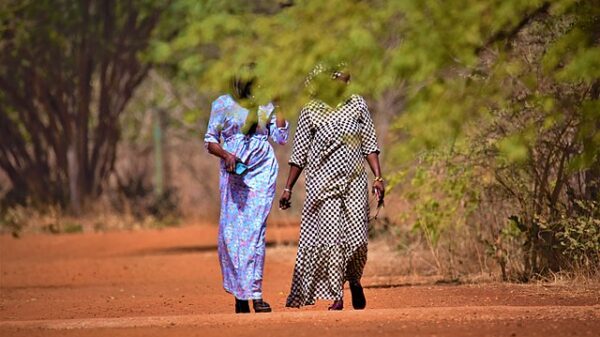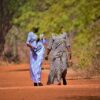Boston Political Review writer Sujena Soumyanath on the impacts of gold mining in Brazil on the indigenous populations and communities.
In January this year, the Associated Press reported that the illegal gold mining site in the Raposa Serra do Sol Indigenous Reserve, located in Brazil’s northernmost state of Roraima, had resumed operations. The site is located on the flanks of the Serra do Atola mountain, which the Macuxi people — the local Indigenous population — hold sacred. Here, labourers excavate ore (the material that makes up the earth’s crust in which gold is found) from rocky pits in the process of extracting precious gold.
The site’s reopening came after authorities shut down the area only a few months earlier. According to Brazil’s 1988 Federal Constitution, mining activity is illegal inside the country’s indigenous reserves. Despite these regulations, a 2021 study found that illicit gold mining had greatly expanded across the indigenous territory and other protected areas.
What is causing an increase in mining?
International demand has been a driving cause of the country’s expanded gold mining activities, both legal and illegal. In just two years, the price of gold has risen from $400 to $1,800 an ounce, encouraging miners to capitalize on the precious metal’s surge in value. The incentive to mine in Brazil has been incredibly strong. Currently, the country stands among the top ten exporters of gold in the world, despite much of it being illegally mined.
When looking for the causes of Brazil’s mining boom, one easily finds the pro-mining rhetoric of the country’s controversial, far-right President Jair Bolsonaro. BBC reports that Bolsonaro, a known climate change sceptic, believes the indigenous reserves are “too big in relation to the number of people who live there†and views them as an obstacle to development. He has fought to overturn bans on prospecting in many of Brazil’s reserves, hoping that these territories could provide socioeconomic gains to the country if allowed to be mined. Bolsonaro is one of the major public opponents to Raposa Serra do Sol’s status as a protected reserve and has argued against this status since 2005.
Bolsonaro is also a known supporter of “garimpo”, Brazil’s controversial practice of artisanal mining. On February 14, he launched a plan to expand “garimpo” work in the Amazon rainforest, thereby legitimising gold miners’ often illegal incursions into protected Amazon territory as they hunt for gold. Bolsonaro, whose grandfather was also an artisanal miner, argues that expanding “garimpo” work will “foster sustainable development for the region and nation”.
The impact on Indigenous populations
The push for more mining on indigenous territories has not been without strife. Yanomami, Brazil’s largest indigenous reserve, has long been sought out by gold miners for its mineral-rich environment. In June of 2021, United Nations human rights experts brought attention to the recent increase in violence in the region as a result of clashes between the Indigenous population and the some 20,000 illegal miners searching for gold.
According to their report, the Yanomami people experienced repeated shooting attacks, along with other acts of intimidation from illegal miners. In May 2021, two Yanomami children were found dead at the Uraricoera River following an armed attack. Often equipped with high-calibre firearms and usually operating in gangs, these illegal miners have shot at tribesmen and federal agents alike.
The Munduruku people, another Indigenous group in Brazil, have also faced violence from miners. In May 2021, armed miners attacked a Munduruku village, firing shots and setting two houses on fire. One of the houses belonged to Maria Leusa Kaba, coordinator of the Wakoborum Women’s Association and outspoken advocate against illegal mining in the area. The Association and Leusa are no strangers to these attacks. In recent years, Leusa has even received death threats over her opposition to illegal gold mining.
The UN reports that attacks are mainly aimed at intimidating the Munduruku people and other groups trying to prevent illegal logging and mining on their land. In a 2021 interview with Al Jazeera, Junior Hekurari, the head of a Yanomami health council, explained that the recent increase in violence came after tribesmen attempted to stop miners’ travel upriver and confiscated some of their weapons.
The Yanomami barriers, which triggered violent attacks in early 2021, were also put up as an attempt to stop the spread of Covid-19, something which the large presence of illegal miners in the area has exacerbated. A 2020 report found an over 250% increase in Covid-19 cases within Yanomami territory over a three-month period. According to the vice president of Hutukara, a Yanomami association, illegal miners invading indigenous land are the principal cause for this spike in case numbers.
For the Yanomami population, the introduction of COVID-19 to their communities poses a far more devastating threat than to the larger Brazilian community. This is because many parts of the Yanomami population continue to live completely separate from wider Brazilian society, making them particularly vulnerable and less resistant to outside diseases introduced by miners.
The environment is being damagedÂ
The widespread increase in gold mining has also had a profound impact on the physical environment of Brazil’s indigenous populations. Miners often dredge rivers to extract gold, a process that stirs up heavy metals and leaves them to stagnate in the bodies of water. Chief among these metals is mercury, which can accumulate in the flesh of fish. As the toxic metal makes its way up the food chain, larger animals — including Brazil’s Indigenous people – rely on fish as their main source of protein. One study revealed that over 92% of the Yanomami population that lived near illegally mined areas had unsafe levels of mercury in their bodies. This can have devastating health effects. Consuming large amounts of mercury can cause neurological damage in children and even affect pregnant women by harming the developing fetus.
In addition to causing mercury contamination, a 2021 study found that illegal mining has led to an exacerbation of deforestation. Deforestation, which in 2020 was at a 12-year high, has mainly occurred on indigenous territory, negatively affecting local populations who depend on the forest for their traditional medicines, fishing, and hunting. As Hekurari describes it, “the water became mud. Even the great rivers are now yellow. We cannot fish anymore in several places where we used to fish”.
The haunting parallels between gold mining and colonialism
Despite these corrosive effects, the sentiment for mining remains strong. There has even been an effort to make a pro-mining appeal tailored to the Indigenous people, arguing it as an expression of their rights to self-determination. This line of argumentation has gotten mixed responses among indigenous groups. Some members of Brazil’s Indigenous population in Raposa Serra do Sol do see gold mining as an economic opportunity that could bring jobs and investment to the area.
One of these members is Irisnaide Silva, a Brazilian-Indigenous woman who leads The Society for the Defence of the United Indians of Roraima. She believes that “indigenous people have as much right as other Brazilians to exploit their resources”. Silva and her organisation see gold mining as vital to the development of indigenous self-determination. Similarly, in early 2021, a group of Munduruku people who support mining used large signs to protest the Federal Police’s expelling of illegal miners from their land. One critical flaw in this appeal to indigenous self-determination: the statistic remains that only 4% of the profit made from mining stays within the indigenous reserve’s local populations.
In many ways, the modern-day disregard for indigenous land in favour of profit mirrors Brazil’s colonial past. In the 18th century, Portuguese-Brazilian fortune hunters captured Indigenous people for slave labour and searched for precious metals in the region. Today, minerals continue to be Brazil’s most exploited commodity, and as a result, indigenous labour and land also continue to suffer the abuse of current mining practices. Even Bolsonaro’s appeals to the Indigenous people mirror colonisation tactics. Teaming up with certain Indigenous groups has exacerbated tensions between tribes, indicating that Bolsonaro may be applying a divide-and-conquer approach to opening up indigenous land for mining. Historically, this method was used by European colonisers to similarly gain control over native people’s land.
The socioeconomic gains resulting from gold mining are abundant, but so is the harm the activity causes to the Indigenous people. The rapid, often violent encroachment of indigenous territory by gold miners, and the subsequent disease and environmental destruction it has caused, prompts the question, how have Brazilian-Indigenous relations really changed since colonialism?
















